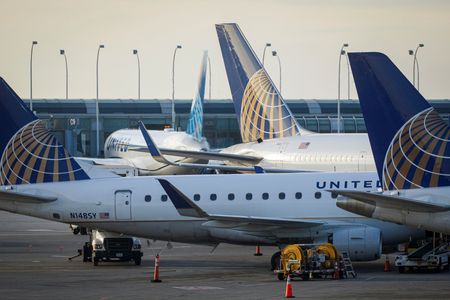 1
1 1
1

By David Shepardson
WASHINGTON (Reuters) – United Airlines said Thursday it will allow unvaccinated employees to return to their jobs starting March 28 and asked a federal appeals court to dismiss a legal challenge to the COVID-19 mandate as moot.
The Chicago-based U.S. carrier said in a memo about 2,200 employees had received vaccine-related reasonable accommodations after it had become the first major U.S. airline to mandate employee vaccines.
“We plan to welcome back those employees who have been out on an approved (accommodation) to their normal positions starting” March 28, the memo said.
United told a federal appeals court Thursday the new policy was “due to substantial changes in the scope and severity of the pandemic as well as the guidance of public-health authorities.”
United said the change applies to all employees who were placed on temporary unpaid leave as well as those temporarily placed in other jobs.
United Chief Executive Scott Kirby in December said that, of the company’s 67,000 employees, about 200 did not comply with United’s mandate and were fired. A United official said the airline has no plans to rehire those employees.
The memo noted the sharp decline in COVID-19 cases in the United States and that the CDC recently relaxed its mask guidelines.
The memo added, “Of course, if another variant emerges or the OVID trends suddenly reverse course, we will reevaluate he appropriate safety protocols at that time.
A U.S. appeals court last month ordered a new review of a lower court decision not to block United from enforcing its employee vaccine mandate. United said Thursday the issue was now moot.
The 5th U.S. Circuit Court of Appeals ruled 2-1 to return the issue to a U.S. District judge who rejected a request for an injunction blocking the mandate while employees argue their case against it.
In a scathing dissent, Judge Jerry E. Smith said “for every conceivable reason that the (employees) could lose this appeal, they should.”
Kirby in December defended the employee mandate: “We did this for safety. We believe it saved lives.”
(Reporting by David Shepardson; editing by Jonathan Oatis)